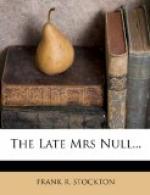It was mail day at the very small village known as Howlett’s, and to the fence in front of the post-office were attached three mules and a horse. Inside the yard, tied to the low bough of a tree, was a very lean and melancholy horse, on which had lately arrived Wesley Green, the negro man who, twice a week, brought the mail from Pocohontas, a railway station, twenty miles away. There was a station not six miles from Howlett’s, but, for some reason, the mail bag was always brought from and carried to Pocohontas; Wesley Green requiring a whole day for a deliberate transit between the two points.
In the post-office, which was the front room of a small wooden house approached by a high flight of steps, was the postmistress, Miss Harriet Corvey, who sat on the floor in one corner, while before her extended a semicircle of men and boys. In this little assemblage certain elderly men occupied seats which were considered to belong to them quite as much as if they had been hired pews in a church, and behind them stood up a row of tall young men and barefooted boys of the neighborhood, while, farthest in the rear, were some quiet little darkies with mail bags slung across their shoulders.
On a chair to the right, and most convenient to
Miss Harriet, sat old Madison Chalkley, the biggest and most venerable citizen of the neighborhood. Mr Chalkley never, by any chance, got a letter, the only mail matter he received being, “The Southern Baptist Recorder,” which came on Saturdays, but, like most of the people present, he was at the post-office every mail day to see who got anything. Next to him sat Colonel Iston, a tall, lean, quiet old gentleman, who had, for a long series of years, occupied the position of a last apple on a tree. He had no relatives, no friends with whom he corresponded, no business that was not conducted by word of mouth. In the last fifteen years he had received but one letter, and that had so surprised him that he carried it about with him three days before he opened it, and then he found that it was really intended for a gentleman of the same name in another county. And yet everybody knew that if Colonel Iston failed to appear in his place on mail day, it would be because he was dead or prostrated by sickness.
With the mail bag on the floor at her left, Miss Harriet, totally oblivious of any law forbidding the opening of the mails in public, would put her hand into its open mouth, draw forth a letter or a paper, hold it up in front of her spectacles, and call out the name of its owner. Most of the letters went to the black boys with the mail bags who came from country houses in the neighborhood, but whoever received letter, journal, or agricultural circular, received also at the same time the earnest gaze of everybody else in the room. Sometimes there was a letter for which there was no applicant present and then Miss Harriet would say: “Is anybody going past Mrs Willis Summerses?” And if anybody was, he would take the letter, and it is to be hoped he remembered to deliver it in the course of a week.




